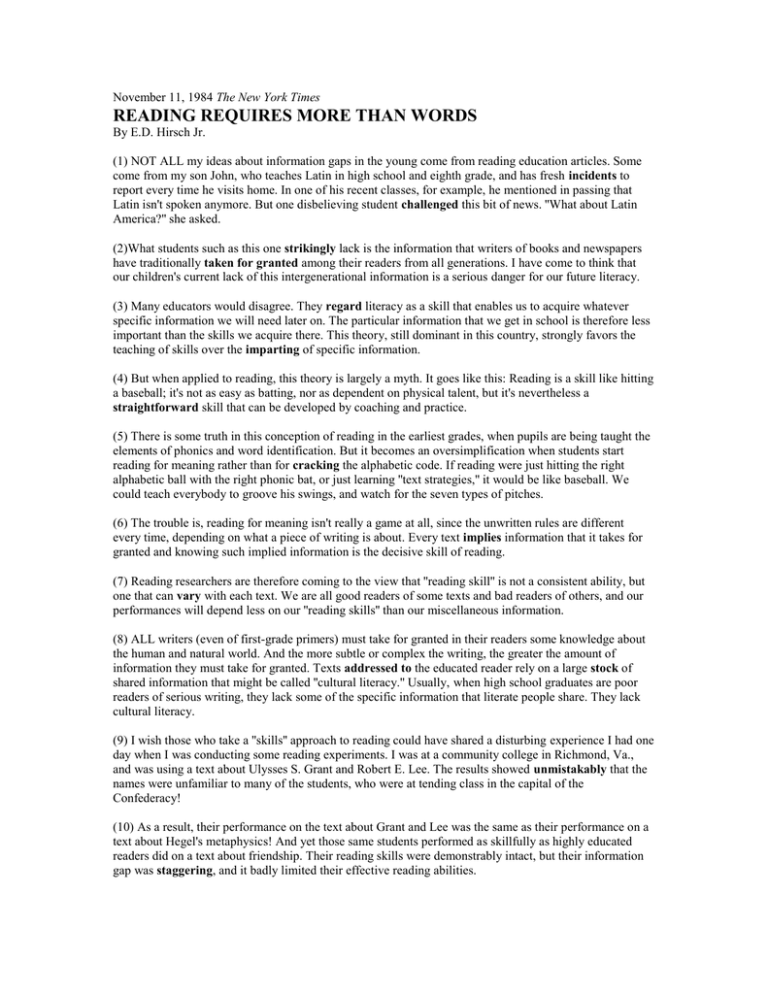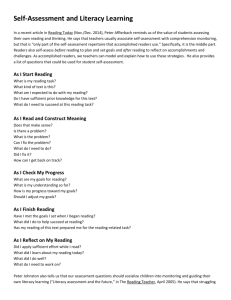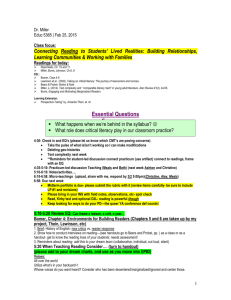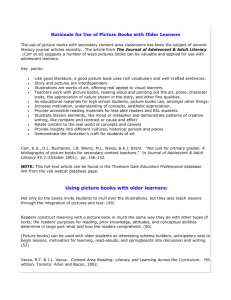Reading Requires More than Words
advertisement

November 11, 1984 The New York Times READING REQUIRES MORE THAN WORDS By E.D. Hirsch Jr. (1) NOT ALL my ideas about information gaps in the young come from reading education articles. Some come from my son John, who teaches Latin in high school and eighth grade, and has fresh incidents to report every time he visits home. In one of his recent classes, for example, he mentioned in passing that Latin isn't spoken anymore. But one disbelieving student challenged this bit of news. ''What about Latin America?'' she asked. (2)What students such as this one strikingly lack is the information that writers of books and newspapers have traditionally taken for granted among their readers from all generations. I have come to think that our children's current lack of this intergenerational information is a serious danger for our future literacy. (3) Many educators would disagree. They regard literacy as a skill that enables us to acquire whatever specific information we will need later on. The particular information that we get in school is therefore less important than the skills we acquire there. This theory, still dominant in this country, strongly favors the teaching of skills over the imparting of specific information. (4) But when applied to reading, this theory is largely a myth. It goes like this: Reading is a skill like hitting a baseball; it's not as easy as batting, nor as dependent on physical talent, but it's nevertheless a straightforward skill that can be developed by coaching and practice. (5) There is some truth in this conception of reading in the earliest grades, when pupils are being taught the elements of phonics and word identification. But it becomes an oversimplification when students start reading for meaning rather than for cracking the alphabetic code. If reading were just hitting the right alphabetic ball with the right phonic bat, or just learning ''text strategies,'' it would be like baseball. We could teach everybody to groove his swings, and watch for the seven types of pitches. (6) The trouble is, reading for meaning isn't really a game at all, since the unwritten rules are different every time, depending on what a piece of writing is about. Every text implies information that it takes for granted and knowing such implied information is the decisive skill of reading. (7) Reading researchers are therefore coming to the view that ''reading skill'' is not a consistent ability, but one that can vary with each text. We are all good readers of some texts and bad readers of others, and our performances will depend less on our ''reading skills'' than our miscellaneous information. (8) ALL writers (even of first-grade primers) must take for granted in their readers some knowledge about the human and natural world. And the more subtle or complex the writing, the greater the amount of information they must take for granted. Texts addressed to the educated reader rely on a large stock of shared information that might be called ''cultural literacy.'' Usually, when high school graduates are poor readers of serious writing, they lack some of the specific information that literate people share. They lack cultural literacy. (9) I wish those who take a ''skills'' approach to reading could have shared a disturbing experience I had one day when I was conducting some reading experiments. I was at a community college in Richmond, Va., and was using a text about Ulysses S. Grant and Robert E. Lee. The results showed unmistakably that the names were unfamiliar to many of the students, who were at tending class in the capital of the Confederacy! (10) As a result, their performance on the text about Grant and Lee was the same as their performance on a text about Hegel's metaphysics! And yet those same students performed as skillfully as highly educated readers did on a text about friendship. Their reading skills were demonstrably intact, but their information gap was staggering, and it badly limited their effective reading abilities. (11) A telling experiment was conducted a few years ago by Prof. Richard Anderson of the University of Illinois and his associates. Readers in India were given a text about an Indian wedding and a text about an American wedding. Readers in America were given the same two texts. Although all readers were familiar with the vocabularies in both texts, the Indians read well only about the Indian wedding, and the Americans read well only about the American wedding. Why? Because the background knowledge of the two groups was decisive in controlling their reading skills. (12) What are the educational implications of this advance in our understanding of reading ability? Obviously, it should make us skeptical about advice to put emphasis on ''real skills'' rather than on specific information. Specific information is the basis of real skills. Moreover, since the literacy of our students depends on their knowing background information that other literate Americans know, we should concern ourselves with the character and breadth of the information conveyed in the schools. (13) WHAT is that information? Roughly speaking, it is information taken for granted by serious writers. It need not remain a secret. It could be made explicit, and educators are working to make it so. (14) My son once asked a class whether anybody knew the name of a work by Homer. One eager hand shot up: ''The Alamo!'' My son then interrupted his lesson to say something about the ''Iliad,'' and also explained the Alamo. (15) We cannot assume that the shared background information necessary to true literacy will be acquired through an invisible hand, or through television. Television's information is important, but it does not connect us with the writing of the past. (16) The quality of our economy and our political and cultural life is going to depend on the quality of our literacy. And the quality of our literacy is going to depend on the breadth of the information that we share. This means that we must pay renewed attention to the specific knowledge that we want high school graduates to have. We mustn't continue to foster the illusion that if our schools take care of the formal skills, the content will take care of itself. (17) JEFFERSON made a famous remark about the importance of newspapers to American democracy. But only the first part of it is usually quoted. Here it is in its entirety: ''Were it left to me to decide whether we should have a government without newspapers, or newspapers without a government, I should not hesitate a moment to prefer the latter. But I should mean that every man should receive those papers and be capable of reading them.'' (18) We now know that all Americans will not be capable of reading those papers, and that we will not enjoy universal literacy, unless we manage to attain universal cultural literacy as well. E.D. Hirsch Jr. is William R. Kenan Professor of English at the University of Virginia.





